
|
65º NEWSLETTER 13 OCTOBER 2020 | ENGLISH VERSION |
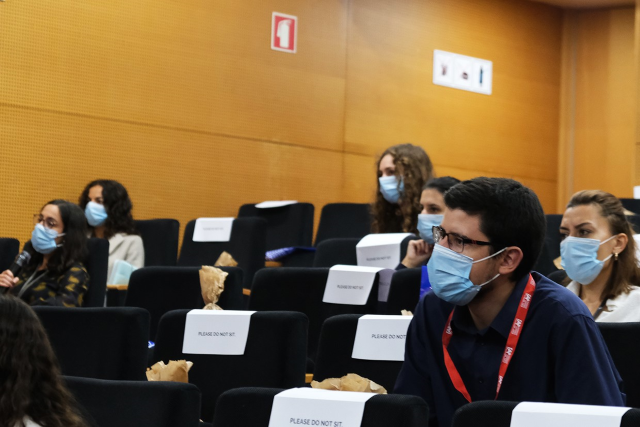
|
|
The priority is to maintain safe behavior |
|
EDITORIAL We must avoid, at all costs, contagion within the i3S |
|
I can’t start this editorial without referring to the epidemiological situation in recent weeks and in Portugal. As everyone knows, the situation has been getting worse and unfortunately I have to report that we have had several i3S employees who have tested positive for SARS-CoV-2. In all cases, the i3S has strictly followed the procedures defined in our contingency plan. All cases were reported to the occupational health doctor and the health authorities - who identified their closest contacts and instructed a very small number of employees to enter prophylactic quarantine.
An analysis of the cases showed that everyone was infected outside our institution, which gives us confidence about the protocols that have been implemented. Thus, I cannot fail to remind everyone about the need to maintain safe behaviors: wearing a mask whenever you are inside the institution, follow social distancing, and avoid gatherings as much as possible. We must continue with all measures so that the number of infected people remains low and at all costs avoid contagion within the i3S. All employees who develop symptoms must take the appropriate measures, stay in isolation, inform H&S, and refrain from attending the institution. Despite the situation, the i3S continues to operate on a regular basis, so we all have to make an effort so that the situation does not change. The management, together with the H&S unit, continues to monitor the evolution of the situation within the institution on a daily basis and will continue to report on its development and take the necessary measures to maintain the safety of all.
On a more positive note, I can inform you that from next week the Young Scientist’s seminars will take place in the Mariano Gago amphitheater and will be broadcast online in order to reach a larger number of participants. It has not yet been possible to resume the Friday Noon Seminars, but we continue to analyze the situation.
Another positive note, which I would like to highlight, are the recent successes that our researchers have achieved. A project on gene therapy for spinal cord injuries by researcher Diana Machado of the “Nerve Regeneration” group led by researcher Mónica Sousa received the CaixaImpulse award from the La Caixa Foundation. The researcher Meriem Lamghari, who leads the group “Neuro & Skeletal Circuits”, saw the approval of the European project “FLAMIN-GO”, of which she is a part, and which intends to develop an organ-on chip platform to mimic rheumatoid arthritis of the joint and testing drugs in a personalized way. I also want to highlight the awards obtained by PhD students or i3S researchers at various international conferences, namely Diana Fonseca for her work on innovative treatments against Helicobacter pylori, Flávia Castro for her work on the immunomodulatory role of chitosan nanoparticles and poly-γ-glutamic acid in breast cancer, and Pedro Miguel Alves for his presentation on dressings against bacteria that frequently appear in chronic skin wounds.
Finally, leave on a note of confidence: if everyone maintains a responsible attitude, it will be possible to overcome the situation of exception that we currently experience.
Claudio Sunkel
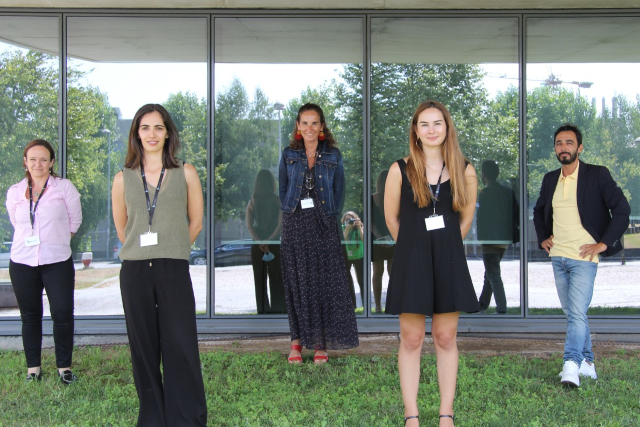
|
|
i3S genetic therapy for spinal cord injuries funded by CaixaImpulse program With the objective of creating a gene therapy for human spinal cord injuries, the proposal led by researcher Diana Machado from the Institute of Research and Innovation in Health of the University of Porto (i3S), was one of the 23 biomedical research and innovation projects funded by the program CaixaImpulse, from the “la Caixa” Foundation. Awarded in the CaixaImpulse Validate category, which aims to support projects in their technology transfer process, this work will receive support up to 100 thousand euros. Every year between 250,000 and 500,000 people around the world suffer a spinal cord injury. Patients may experience a wide variety of disabling symptoms such as loss of motor function, loss of sphincter control, and an inability to regulate blood pressure. To date, explains Diana Machado, “There are no effective treatments, because spinal nerves cannot regenerate. However, our group identified a protein that enhances neuronal regeneration after an injury to the sciatic nerve and spinal cord. Our aim is precisely to take advantage of this knowledge and develop it to create a gene therapy that can be used in situations of human spinal cord injuries”. Specifically, adds the researcher from the group “Nerve Regeneration”, this work “focuses on the use of a modified version of the protein profilin-1, which we have found to be a potent inducer of axonal growth, to induce regeneration after spinal cord injuries. Profilin-1 is present in cells and regulates cytoskeletal dynamics processes, and aroused great interest when it was found to be able to promote axonal growth in animal models”. Right now the i3S team is analyzing the effects of administering the mutated form of the protein to animals with spinal cord injuries in an acute and chronic post-injury period. Mónica Sousa, who leads the research group, adds that “the administration of the mutant form of the protein is done by introducing the sequence that encodes it into a viral vector (an adeno-associated virus), which after intravenous injection allows neurons to express a greater amount of active profilin-1”. “If it turns out that after a spinal cord injury profilin-1 induces an increase in nerve regeneration and can improve recovery, this therapy has great clinical potential”, highlights Mónica Sousa. “The funding we received from the CaixaImpulse program”, adds Diana Machado, “will allow us to continue our work, testing various periods of therapy administration, duration of its effectiveness and toxicity of profilin-1 in order to enter into clinical trials and license therapy”. |
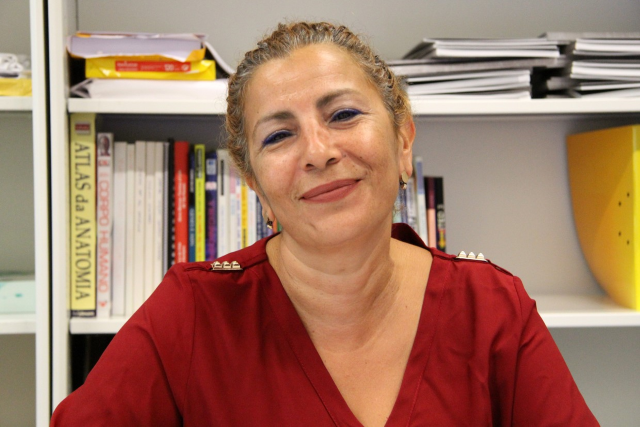
|
|
i3S uses microchips to personalize rheumatoid arthritis treatments The FLAMIN-GO project (which the i3S is part of) was recently financed by the European Union under a Research and Innovation Action (RIA) with six million euros. The objective of the consortium, which comprises 14 institutions from nine countries, is to develop an organ-on-a-chip platform to mimic rheumatoid arthritis of the joint and test drugs in a personalized way. Rheumatoid Arthritis is a chronic autoimmune and inflammatory disease that causes pain, edema (swelling), stiffness, and loss of function in the joints. It is characterized by an inflammation of several joints, which can affect and cause changes in the cartilage, bone, tendons, and ligaments of different joints. There is usually symmetrical involvement, that is, it affects both wrists or both knees. It most often affects the wrists and fingers, but it can also reach feet, shoulders, knees, elbows, hips and cervical spine, among others. RA affects between 0.5-1.5% of the population in industrialized countries and in Portugal it varies between 0.8 and 1.5%. It is four times more prevalent in women than in men and the peak incidence in women is after menopause. Still, it can occur in people of all ages, including teenagers. Although the disease has no cure, there are already many treatments available, although not always effective. Clinicians and researchers are unanimous in stating that it is increasingly urgent to adapt therapies to the profile of each patient. It was with this aim of personalizing the treatments for rheumatoid arthritis that the European consortium FLAMIN-GO decided to develop a platform that mimics all tissues (cartilage, synovial tissue, vascular system, and immune cells) affected by this inflammation. “Each of these tissues will be in a block, organized as if they were pieces of lego, and the sensors will capture this pathological environment (to better understand the disease) and understand how the tissues react when we test the drugs”, explains Meriem Lamghari, leader of the i3S research group “Neuro & Skeletal Circuits”. This platform, says the researcher, “integrates several technologies - microfluidics, sensors, bio-printing and Imaging Mass Cytometry. In addition, cells derived from biopsies of patients with rheumatoid arthritis will be used, which will allow the development of the appropriate therapy for each patient. In other words, to obtain an individualized, personalized therapy”. The project foresees the creation of a startup company to commercialize this platform. The mission of the Portuguese research group, which will receive around half a million euros, is to develop the compartment that mimics vascular tissue in inflammatory conditions. The funding that we are going to receive, the researcher says, “will allow us to hire four researchers, two post-doctorates, and two technicians”. This work is linked to three other European projects already underway; RESTORE - for which the i3S researcher is the coordinator and which focuses on the development of solutions based on nanomedicine strategies for the regeneration of articular cartilage, PREMUROSA - betting on personalized medicine for musculoskeletal diseases and active aging, and BonepainII - whose main objective is to develop new therapies for skeletal pain. |
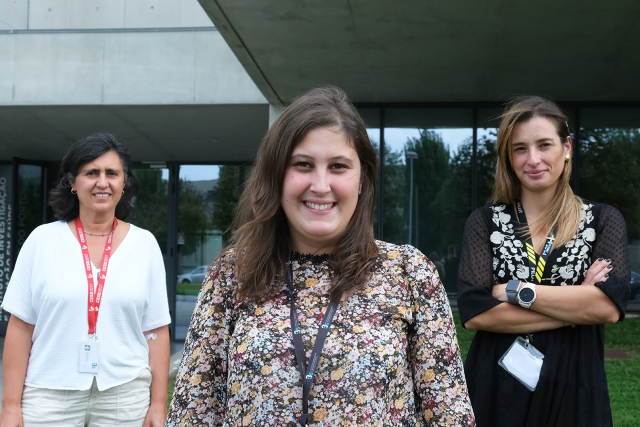
|
|
Helicobacter pylori work worth a prize for i3S researcher Researcher Diana Fonseca, student of the Doctoral Program in Biomedical Engineering at the Faculty of Engineering of the University of Porto, and working in the group “Bioengineered Surfaces” at the Institute of Research and Innovation in Health of the University of Porto (i3S), was recently awarded the “Best poster presentation 2020” prize at the “33rd Workshop of the European Helicobacter and Microbiota Study Group”. Called “A deadly hug: chitosan microspheres functionalized with MSI-78A antimicrobial peptide kill Helicobacter pylori” the work of Diana Fonseca, supervised by Cristina Martins and Paula Parreira, focused on an alternative strategy to classic antibiotics for the treatment of gastric infection by Helicobacter pylori (H. pylori). This bacterium, present in 50% of the world population, is related to the appearance of gastritis, peptic ulcer, and certain types of gastric cancer. The available treatments, based on combinations of at least two antibiotics, fail in about 30% of patients. Because of it’s resistance to available antibiotics H. pylori is considered by the WHO as one of the bacteria that poses the greatest threat to public health. In this work, explains Diana Fonseca, “antimicrobial peptides were used (peptides produced by different organisms in a defense or immune response context) whose bactericidal efficacy against H. pylori was previously demonstrated by our group. We know that in the gastrointestinal tract these peptides can undergo degradation and/or aggregation, which leads to a reduction in their effectiveness, but these disadvantages can be overcome by their immobilization on the surface of a biomaterial, in this case the chitosan microspheres”. In order to “overcome gastric degradation after its oral administration”, add Cristina Martins and Paula Parreira, “these microspheres were cross-linked with biocompatible compounds to maintain their integrity in a pH range that mimicked the gastric environment”. Diana Fonseca clarifies that “when tested against a highly pathogenic human strain (H. pylori J99), these microspheres have a bactericidal effect after 2 hours”. The results of this study, the researchers conclude, “reveal the high potential of this innovative strategy for the eradication of H. pylori infection”. |
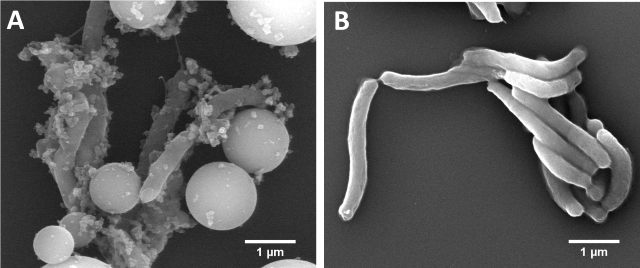
A) Destructive effect of the microspheres developed on the morphology of the bacterium Helicobacter pylori; B) Helicobacter pylori (images obtained by scanning electron microscopy) |
|
For the young researcher Diana Fonseca to have received an award in an area she likes so much, it represents “enormous pride”: “The recognition of this innovative strategy in this conference that’s so important for the area was very gratifying, not only for me but for everyone involved at work. And it is, without a doubt, an incentive to continue the studies and possibly manage to overcome one of the great difficulties that has been faced: resistance to classic antibiotics by this gastric pathogen”. |
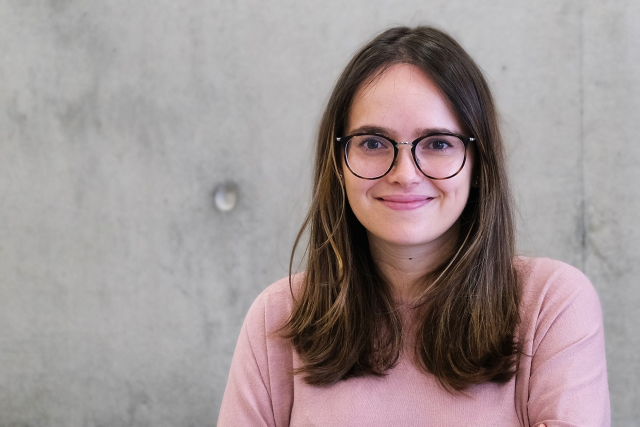
|
|
Liga Portuguesa Contra o Cancro recognizes work of i3S researcher Researcher Flávia Castro, from the Institute of Health Research and Innovation at the University of Porto (i3S), was recently awarded the Best Poster Award by the Portuguese League Against Cancer in recognition of the research work presented during the Web Conference Cancer Biology: from basic to Translational Research. The work developed by Flávia Castro, entitled “Chitosan / γ-PGA nanoparticles-based immunotherapy as adjuvant to radiotherapy in breast cancer”, was coordinated by researchers Maria José Oliveira and Raquel Gonçalves in close collaboration with researchers Mário Barbosa and Fátima Gartner, from the i3S, and Olivier de Wever, from the Laboratory of Experimental Cancer Research, in Ghent, Belgium. This study is based on the immunomodulating role of chitosan and poly-γ-glutamic acid nanoparticles (naturally occurring polymers), recently published by the researcher in the scientific journal “Biomaterials”, one of the most prestigious in the area of Biomaterials and Development of Therapies. The results of the award-winning study demonstrated, in an animal model of breast cancer, that the nanoparticles of these naturally occurring substances, when combined with conventional therapies, such as radiotherapy, significantly slow the growth of the primary tumor and inhibit the formation of lung metastases, clarifies Flávia Castro. Basically, what happens is that there is a change in the immune response, that is, a decrease in immunosuppressive cells and an increase in T cells, precisely the cells of the immune system that will attack the tumor. These results, emphasizes Flávia Castro, show that the “nanoparticles of these natural polymers, through the regulation of the immune response, enhance the anti-tumor effect of radiotherapy and are very promising as combinatorial therapies in the treatment of cancer”. This award represents yet another recognition of the consistent work that the researcher has been doing. Flávia Castro was recently awarded the Best Student Award by the European Society for Biomaterials and received other distinctions: European Association for Cancer Research (EACR), Portuguese Association for Cancer Research (ASPIC), Portuguese Society of Immunology (SPI), COST Short Term Scientific Mission, and GESINAS Immunotools Award. The award-winning work is part of a project financed in 2018 by the Foundation for Science and Technology (FCT) and led by i3S researcher Maria José Oliveira. |
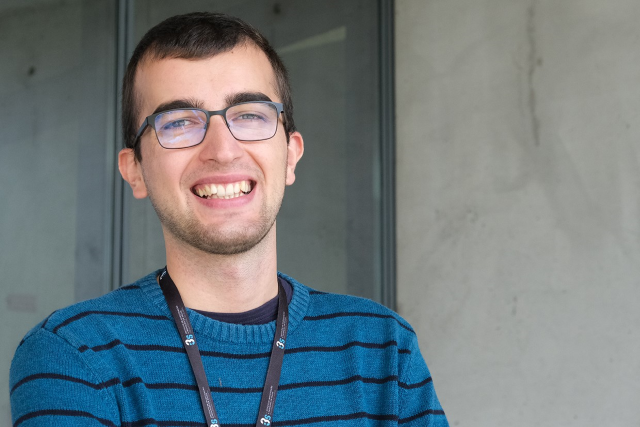
|
|
i3S researchers explore high-performance chemistry to fight infected wounds PhD student Pedro Miguel Alves, from the Institute of Research and Innovation in Health of the University of Porto (i3S), was recently awarded with the prize for best oral presentation in the 1st edition of the “EUGLOH Annual Student Research Conference | Global Health Challenges: Diseases of Modern Life”, in the panel “Cancer screening and care, Antimicrobial resistance”. The work consisted of producing a coating that increases the effectiveness of the dressings against the bacteria that often appear in chronic skin wounds. Student of the doctoral program in Biomedical Engineering (PRODEB) at FEUP, and currently beginning the 2nd year, Pedro Miguel Alves is developing his work at i3S, in the group “BioEngineered Surfaces”, under the guidance of researcher Cristina Martins and co-supervision researchers Cristina Barrias (i3S) and Paula Gomes (LAQV-REQUIMTE, FCUP). The main objective of this team's work, explains the researcher “is to develop a new polymer with antimicrobial properties to be used in the dressing coating for treatment and prevention of infections in chronic skin wounds. For that, we immobilized antimicrobial peptides (AMP) in a natural polymer derived from the crustacean exoskeleton (chitosan) and maximized the chemical efficiency to be able to use this polymer in an industrial context”. For this, says Cristina Martins, leader of the research group “BioEngineered Surfaces”, “we resorted to a high-performance chemoselective strategy that is still little explored and we found that not only were we able to have a more efficient immobilization chemistry, but the antimicrobial effect of the peptide was preserved”. Basically, highlights the researcher, this work “explores a selective chemistry of high performance to facilitate the production of antimicrobial dressing coatings in the future”. The development of dressings with antimicrobial properties for the local treatment of infections in skin wounds, stresses Pedro Miguel Alves, “will have a high impact in combating infections in patients with chronic wounds, including those caused by multi-resistant hospital bacteria”. For the young researcher, this award represents “an acknowledgment of the maturation of all the teamwork that has been developed and that has only been possible with the support of supervisors Cristina Martins, Paula Gomes and Cristina Barrias and the tireless help of Fabíola Costa, Rúben Pereira, Natália Fagundes, and Cátia Teixeira”. |
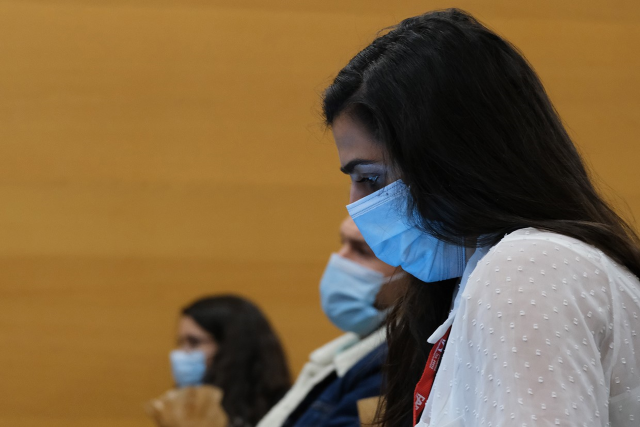
|
|
Global survey reveals the social and emotional impact of Covid-19 In order to assess the implications of the pandemic on the daily lives of people around the world, a worldwide survey called “Life with Corona” was launched about six months ago. The first results, obtained from 12 thousand responses from more than 130 countries, were recently released and revealed cultural and generational differences. The data obtained led to the conclusion that family stress during the pandemic falls, disproportionately, on women, that older people are less concerned with the new coronavirus and that Americans want to have priority in accessing a vaccine. But the pandemic continues and there are still many implications to assess, so on October the 1st, the second phase of the investigation was launched. The aim is to reach a greater number of people worldwide and obtain more global data on the social and economic impact of COVID-19. Researchers therefore call on citizens to, in the name of Science, share their experiences. You can access and participate in the survey here. The “Life with Corona” initiative came from a team of international researchers in the field of social sciences; from ISDC - Center for International Security and Development, from the World Institute for Research in Development Economics of the United Nations University (UNU-WIDER), from the Leibniz Institute for Vegetable and Ornamental Cultures (IGZ), and the Institute for Development Studies (IDS), and had the participation of institutions and organizations from various countries. In Portugal, it had the Institute of Research and Innovation in Health of the University of Porto (i3S) as a partner. “Coronavirus has changed the lives and livelihoods of billions of people around the world, with unprecedented speed and strength. It is not just a medical pandemic, it is also a social pandemic”, stated Tilman Brück of the ISDC (International Security and Development Center) and the Leibniz Institute, which initiated this investigation. “Our lives are changing rapidly, fundamentally and permanently. New sources of conflict are emerging within families, between generations and between countries. Even if we defeat the virus soon, its legacy will shape our societies for a long time. We want to document these changes in real time”, adds Wolfgang Stojetz, from the ISDC, who was responsible for analyzing data from the “Life with Corona” survey. “Life with Corona” is a non-profit research project based on rigorous academic methods. It was created by researchers in order to record the voices and humor of citizens around the world during this unusual period of pandemic. The project will provide data to support sustainable socio-economic responses to the COVID-19 pandemic. |
|
14 OCT 2020 | 12:00 | AUD. CORINO DE ANDRADE Graphene-based materials for photothermal therapy of skin cancer Raquel Almeida | Young Scientists & Pos-doc Seminars 15 OCT 2020 | 12:00 | AUD. MARIANO GAGO Bioengineering the matrix for tissue repair / regeneration: inflammation in a biomaterials mindset Mário Barbosa | Group Leader Seminars 16 OCT 2020 | 12:00 | Chair: Eurico Sá Cell migration and cell polarity in vascular morphogenesis Cláudio Franco, Instituto de Medicina Molecular | ONLINE FRIDAY NOON SEMINAR 21 OCT 2020 | 12:00 | AUD. CORINO DE ANDRADE Orofacial characterization of monozygotic and dizygotic Portuguese twins: a forensic perspective Susana Braga | Young Scientists & Pos-doc Seminars 28 OCT 2020 | 12:00 | AUD. CORINO DE ANDRADE Nanomedicine for the next era of RNA therapeutics in Stroke Sofia Santos | Young Scientists & Pos-doc Seminars 29 OCT 2020 | 12:00 | AUD. MARIANO GAGO Immunity and vaccination against the protozoan parasite Neospora caninum: the usual suspects and beyond Manuel Vilanova | Group Leader Seminars |
30 OCT 2020 | 12:00 | Chair: Helder Maiato Pattern Formation and Regeneration in a Single Cell Wallace Marshall, UCSF, EUA | ONLINE FRIDAY NOON SEMINAR 4 NOV 2020 | 12:00 | AUD. CORINO DE ANDRADE Rab27a regulates pancreatic cancer progression through immune cell modulation Nuno Bastos | Young Scientists & Pos-doc Seminars 11 NOV 2020 | 12:00 | AUD. CORINO DE ANDRADE Potential pancreatic cancer therapeutic targets identified in the cargo of extracellular vesicles released by human macrophages Cristina Xavier | Young Scientists & Pos-doc Seminars 18 NOV 2020 | 12:00 | AUD. CORINO DE ANDRADE Gene regulation in the tumor-macrophage crosstalk Joana Wilton | Young Scientists & Pos-doc Seminars 20 NOV 2020 | 12:00 | Chair: Ana Magalhães Extracellular vesicles and lipoproteins rewire glioma metabolism Mattias Belting, Lund University, Sweden | ONLINE FRIDAY NOON SEMINAR |

EVENT 12 October 2020 |
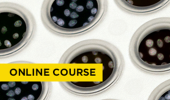
TRAINING 12 - 16 October 2020 |
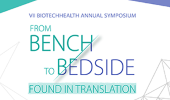
EVENT 22 October 2020 |
||||
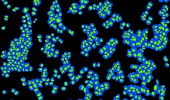
TRAINING 18 - 20 November 2020 |
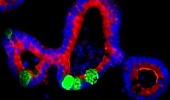
EVENT 23 November 2020 |
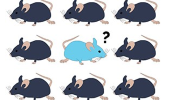
TRAINING 20 - 22 January 2021 |
|
|





